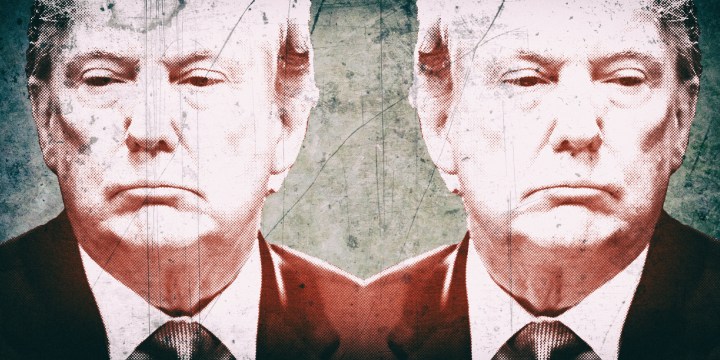UNITED STATES OF DYSTOPIA
Send HIM where HE came from: Trump at the crossroads

This week past has shown just how poorly US President Donald Trump understands the government, the country, its people, or the ideals their republic was founded on, more than two centuries ago. Best if the message is to send him home.
Over the years, this writer has been a fascinated (and sometimes terrified) reader of dystopian novels. Dystopian novels, of course, eventually evolved as a response to the more Utopian ones. Centuries ago, Sir Thomas More had written the first real Utopian novel, not surprisingly named Utopia, from the Greek words for “no place”. More had laid out a world where strife and want had been vanquished; but more recently, from the 19th century onward, other writers had picked up on this idea as well.
Edward Bellamy’s Looking Backward, published at the end of the 19th century was, in its time, one of the great propagators of the view (and a global bestseller to boot) that technology would solve all the ills of society, eliminating poverty, envy, hunger, greed and exploitation — by the year 2000.
In response, to views like Bellamy’s uber-rational technocratic solution, its antonym, the “dystopia”, was born. Aldous Huxley gave us Brave New World, BF Skinner wrote Walden Two, Yevgeny Zamyatin authored We, and perhaps the most terrifying of all was George Orwell’s Nineteen Eighty-Four. Importantly, Orwell’s universe had no new inventions, drugs or medical miracles in it – just a decaying landscape of severe psychological oppression, the loss of individual security and most quotidian pleasures in the beauty of small things, and ever-growing privation, all cruelly masquerading as peace, stability, truth, and plenty.
In the last decades of South Africa’s apartheid era, three especially fine (but hopefully still not prophetic) novels of a possible future were written by a trio of the country’s most important literary voices: Nadine Gordimer’s July’s People; JM Coetzee’s The Life and Times of Michael K; and Karel Schoeman’s Promised Land (Na Die Geliefde Land). Each of the volumes presented a portrait of a future South Africa riven with racial and other fighting – and very little joy. Thankfully we have not come to that, but each of these volumes, at the time they were written, served as a clear warning, a shot across the bow, that it might become so.
In the US, the dystopian tradition reaches back to Jack London’s The Iron Heel, Sinclair Lewis’s It Can’t Happen Here, and more recently, Philip Roth’s The Plot Against America. After Donald Trump’s election to the US presidency in 2016, there was a sudden spate of essays remarking on the continuing relevance of books like Nineteen Eighty-Four, It Can’t Happen Here, and Roth’s novel as prescient guides to a likely future, now that a man like Trump was in command of things.
Once he was in office, there has been the roster of bellicose threats against his domestic opponents, the unending efforts against visitors, migrants and refugees from reviled nations, the unwinding of a generation’s worth of domestic environmental and consumer protection advances, the ongoing attacks against the 70-year-old Western international security architecture, the cozying up to an appalling group of autocrats and dictators as if they were more reliable allies than the country’s longtime partners, the abrogation of US participation in major global climate initiatives, the constant roiling of the country’s trade relationships and the picking of simultaneous economic or trade squabbles with Canada and Mexico, China, and Iran, among other states.
These have all been part of a more general “go it alone”, “America First” approach, even if that has too often meant that favoured domestic interest groups such as the rich and pollution-heavy businesses have been the primary recipients of government largesse, to the detriment of the rest of the nation. And all of this has come in tandem with an ever-present, ever-growing cheapening of the national conversation, dividing the country into his supporters and outcasts.
But the events of this past week have now given us increasingly strong indications that London’s, Roth’s, and Lewis’s books are not just the fevered imaginings of a trio of thoroughly dyspeptic pessimists about the future of the American experiment that began nearly 250 years ago. We are most definitely no longer in Kansas anymore, Toto. We – in the person and words of the incumbent president – have definitively crossed a frontier, the red line demarcating what is beyond the US’s political and social culture.
In this past week, the president made use of his social media channel, via his statements on national television news coverage, and in raucous public appearances in what are, for all intents and purposes, campaign speeches. He told four freshman US congresswomen to go back to their disgusting, filthy, crime-ridden foreign homelands if they didn’t stop critiquing their country –and most especially criticising him, their one and only true president. As the week wore on, he continued to double, then triple down on this bizarre position, after trying for a day or so to say he really didn’t mean to single them out on racial terms – until coming back, largely, to his initial intemperate screed.
It was not enough that three of the four women were actually born in the US and that the fourth had been a refugee and a naturalised citizen since she was a teenager. (One, Ayanna Pressley, as an African American, had slaves and the descendants of slaves as ancestors, and thus a lineage on US soil that began long before Donald Trump’s paternal grandfather, Frederick, fled Bavarian military service and came to America to open a tavern, though many suspect it served as a brothel, too.) All four were Democratic Party representatives and people of colour.
Of course, they have been highly critical of the president, his policies, and his words. Last time I checked in some of my old political science textbooks, that is their job – or at least one aspect of it. And just by the way, the constitution does after all guarantee freedom of expression – unless they falsely scream fire in an SRO theatre. But things took an even more appalling turn when the president and allies like Senator Lindsay Graham took to calling them, variously, anti-Semites, communists, socialists, and people who hate America. Observers argue this is all in the service of maintaining the fighting trim of his “base” for the 2020 election, but jeez, at what cost to the sensibility of the national psyche!
Some of Congresswoman Rashida Tlaib’s (one of the four congresswomen) words and positions on Israel and Jews more generally have not been well received by many Democrats either, but it is a rather a long stretch from those to labelling her and her three colleagues as anti-Semitic commie harridans who hate the very country that just happened to elect them to Congress. Using anti-Semitism as a descriptor is pretty ripe for the president, after all, given his own description of those white nationalists, neo-Nazis and others of their ilk as “some very fine people” in their torchlit parade in Charlottesville, Virginia, as they chanted obviously anti-Semitic slogans all through the night.
In questioning the very loyalty and patriotism of members of Congress and then smiling like the cat that just ate the household’s prized pet canary – while his followers wailed and howled, “Send her back; send her back!” at a North Carolina rally – Trump has demonstrated contempt for the fundamental US values that separate that country from some place where its leadership finds it just too easy to shoot the occasional journalist or legislator to keep the rest in line, nice and tame.
This sin makes him unfit to occupy the Oval Office, to be in a position to launch a devastating nuclear attack on some other part of the globe, or just to send the Marines into a fatal fool’s errand in the Strait of Hormuz in a fit of pique. Maybe it is time to send him home instead, back to Manhattan, or West Palm Beach, or even to Queens if necessary, and thereby get the whole menagerie of miasmic swamp creatures he has brought into office with him to go to their own respective homes as well.
In Sinclair Lewis’s hopefully non-prophetic novel, the once comfortable small-town editor, Doremus Jessup, ultimately must flee to Canada to carry on the fight against President Buzz Windrup’s increasingly erratic, increasingly authoritarian presidency. Back in the here and now, there are still real checks on his actions. These come in the form of the House of Representatives, much of the federal judiciary, and the wide range of US human rights, civil liberty, and media freedom NGOs, as well as the press itself – if they choose to exert their power. Maybe it would just be best for Congress to put all its many investigations on hold while it concentrates on protecting the rights of citizens, and, crucially, to focus on 2020.
This week, even a usually calm, pro-business publication like The Economist has opined its horror of the Trumpian world view, writing, “Democrats must resist Mr Trump setting their agenda in any way. They do not need revered anti-Trump warriors. They need to be able to rebuke his divisiveness smartly, keeping in mind their own reputation for hyperventilating. The bill introduced by Nancy Pelosi to censure his tweet passed that test. Its citation of a line from Ronald Reagan’s last presidential address, ‘If we ever closed the door to new Americans, our leadership in the world would soon be lost,’ also spoke to the third point [the first two were a warning Trump’s 2020 re-election effort would be even more racially divisive than the previous one, and the second that he will double down on any reviled statement he may make in that election effort] which is the fundamental one: Mr Trump’s exclusionary vision of America is a travesty.”
Yup.
It is time Americans see this struggle clearly for what it is, and the dangers to the country’s core principles that Donald Trump now represents. DM

















